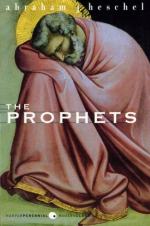
|
| Name: _________________________ | Period: ___________________ |
This test consists of 15 multiple choice questions and 5 short answer questions.
Multiple Choice Questions
1. If ecstasy were a requirement for a prophet, which prophets of the Old Testament would not have been classified as prophets?
(a) Daniel and Zechariah.
(b) Moses and Isaiah.
(c) Micah and Jonah.
(d) Second Isaiah and Habakkuk.
2. Who was Marcion?
(a) A Greek.
(b) A Christian.
(c) A Gnostic.
(d) A Jew.
3. One theory for prophets and their inspiration is that they had madness in them that led to what?
(a) The belief that they had a job to do.
(b) A psychic ability.
(c) The belief that God talked to them.
(d) The desire to be great.
4. Who said that what a poet writes is beautiful, if it is written with enthusiasm and divine inspiration?
(a) Plato.
(b) Heschel.
(c) Democritus.
(d) Philo.
5. What is the origin of pathos?
(a) Hebrew.
(b) Egyptian.
(c) Greek.
(d) Islamic.
6. The nature of man's response to divine reality corresponds to what?
(a) His religious serendipity.
(b) His apprehension of the divine.
(c) His prayer life.
(d) His knowledge of God.
7. Some writers in the Bible say that emotions and feelings have been inspired by whom?
(a) God.
(b) The devil.
(c) The Greeks.
(d) Mankind.
8. Heschel describes God as what?
(a) The ultimate source of the universe.
(b) Someone who cannot be described.
(c) Father.
(d) The ultimate judge.
9. What attitude does Heschel take to other points of view that he uses in his book?
(a) Respectful.
(b) Derogatory.
(c) Disparaging.
(d) Supportive.
10. Heschel contends that the prophets were in what state of mind when they received God's call?
(a) State of ecstasy.
(b) State of consciousness and awareness.
(c) State of passivity.
(d) State of madness.
11. According to some scholars, the goal should not be pathos but what?
(a) Apathy.
(b) Understanding.
(c) Knowledge.
(d) Wisdom.
12. From what civilization do we get the legacy that great poetry comes into being through madness?
(a) Roman.
(b) Greek.
(c) Jewish.
(d) Egyptian.
13. In what religion do you do away with all feeling and obtain a type of peace?
(a) Islam.
(b) Taoism.
(c) Karma.
(d) Hindu.
14. When talking about the inspiration for poetry, who says "One does not ask who gives."
(a) Goethe.
(b) Nietzsche.
(c) Democritus.
(d) Plato.
15. Heschel said that some of the beliefs that the prophets were frauds came from an era when people wanted what?
(a) Rationality.
(b) Certainty.
(c) Conformity.
(d) Shibboleth.
Short Answer Questions
1. What does Tao mean?
2. In addition to using information from Israel's culture, Heschel uses information from what in order to understand the prophets?
3. Heschel contrasts God to other deities, who unlike God, did not have what?
4. What were the prophets overwhelmed with in addition to emotion?
5. What does Heschel say is an end to indifference?
|
This section contains 454 words (approx. 2 pages at 300 words per page) |

|




